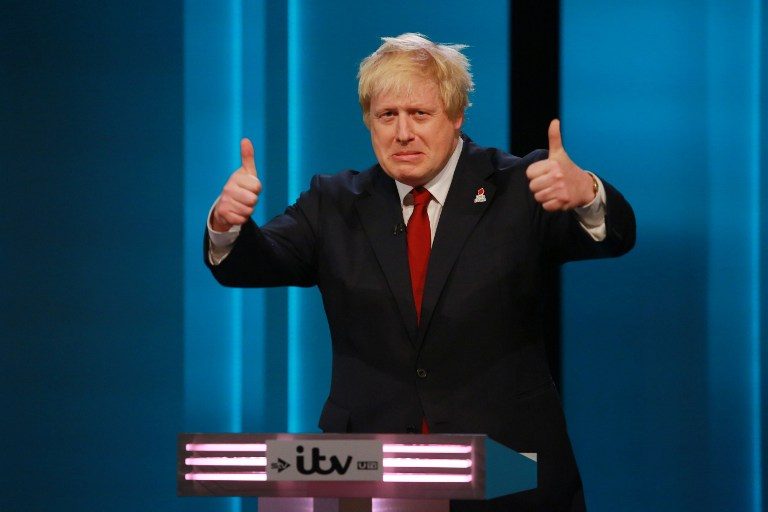SUMMARY
This is AI generated summarization, which may have errors. For context, always refer to the full article.

LONDON, United Kingdom – Charming, scruffy and with his perennial mop of blond hair, top Brexit campaigner and former London mayor Boris Johnson used to be a Brussels correspondent, penning stories that helped foment euroscepticism at home.
Johnson, 51, worked in the city between 1989 and 1994 – a time not unlike the present when Britain’s difficult relationship with Brussels was at breaking point and the Conservatives were deeply split on Europe.
He was hired by the right-leaning Daily Telegraph newspaper and rose to become then prime minister Margaret Thatcher’s favorite writer, partly thanks to punchy articles that mocked Europe’s institutions. (READ: Brexit: The potential consequences)
“He was beating stories up rather than making them up, exaggerating them,” said Christian Spillmann, an Agence France-Presse (AFP) journalist who was in Brussels at the same time.
Some of the more absurd stories have been mantras for British eurosceptics for years and have featured prominently in Johnson’s recent Brexit campaign speeches.
Writing in the left-leaning Guardian newspaper, former Brussels correspondent Sarah Helm complained she had been tasked to look for the kind of stories written by Johnson when she was first posted there in the mid-1990s.
“At that time learning about Euro-myths – smaller condoms, square strawberries, fishermen forced to wear hairnets – took up more time than explaining treaty changes,” she wrote.
“The myths were usually funny, often absurd, sometimes traceable to a grain of truth, nearly always grossly distorted, or totally untrue.
“Very often they had first appeared in The Daily Telegraph. Usually, their creator was Boris Johnson,” she wrote.
Some of his articles were influential, such as one in 1992 under the headline “Delors Plan to Rule Europe” about proposals by then European Commission president Jacques Delors to centralize power in Brussels.
Johnson said the story was seized on by the “No” campaign in the Danish referendum which went against the Maastricht Treaty, signed earlier that year, which had also caused deep political rifts in Britain.
‘Monopolized the press room’
But journalists who worked alongside Johnson when he was in his late 20s remember him more for his skilled networking, provocative questions and party-loving manner than EU nous.
“Nobody could miss him,” Spillmann said, remembering his “messy hair” and “careless” look, his shirt frequently untucked.
Maria Laura Franciosi, a journalist with Italian news agency ANSA at the time, said he was “always asking questions and would not give other journalists a chance”.
“He monopolised the press room,” she said.
At the time French was the official language of the EU institutions and he spoke “very good French even if with a strong English accent,” she remembered.
The ironic twist behind his anti-EU stance is that Johnson knows the inner workings of the bloc’s institutions far better than most people in Britain, where surveys show knowledge about the EU is among the lowest in Europe. (READ: Brexit: A long, complicated divorce)
His father Stanley worked at the European Commission and was later elected as a Conservative Member of the European Parliament.
Johnson himself attended the European School of Brussels before going on to elite British boarding school Eton.
His background made him a natural pick for the role of Brussels correspondent for Daily Telegraph editor Max Hastings, who had first met Johnson when the latter was president of the Oxford Union debating society.
But it was perhaps a surprising choice given that Johnson had been sacked from The Times newspaper for falsifying a quotation from his own godfather, historian Colin Lucas, in a story about an archaeological discovery.
Hastings has since become a searing critic of Johnson and has declared he will be voting “Remain” in Thursday’s European Union membership referendum, partly to thwart Johnson’s rumoured political ambitions.
“Having known Boris for years, I cannot bring myself to cast a vote which could trigger his advance to Downing Street,” Hastings wrote in a column in the Daily Mail tabloid. – Rappler.com
Add a comment
How does this make you feel?
There are no comments yet. Add your comment to start the conversation.